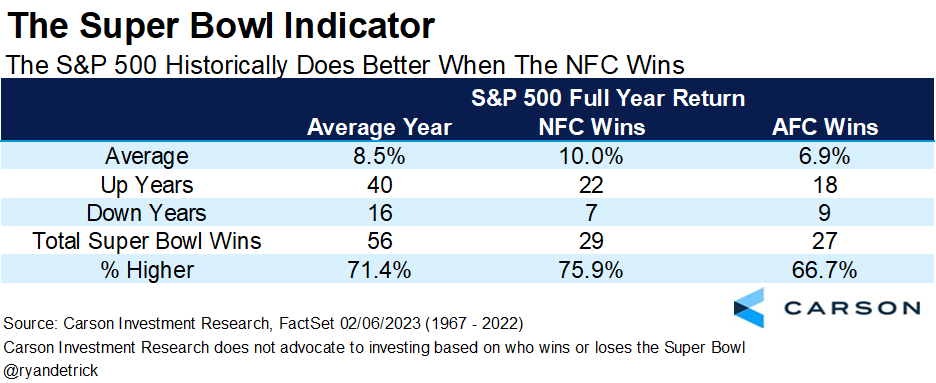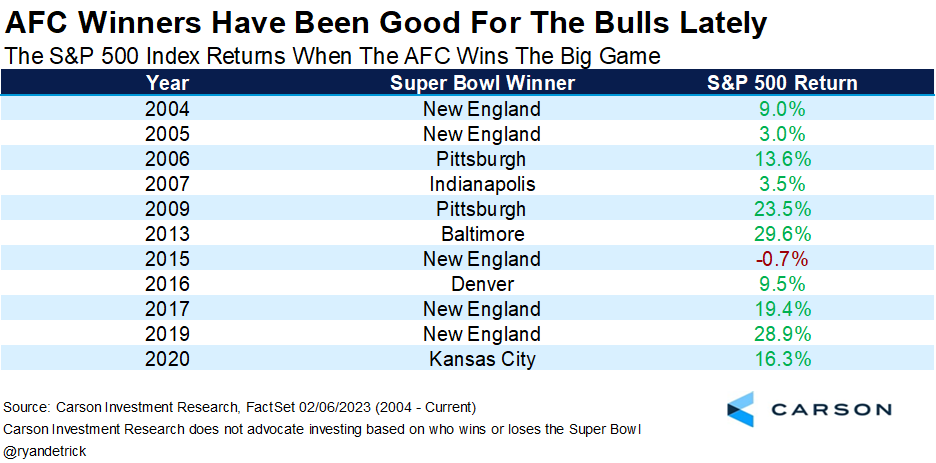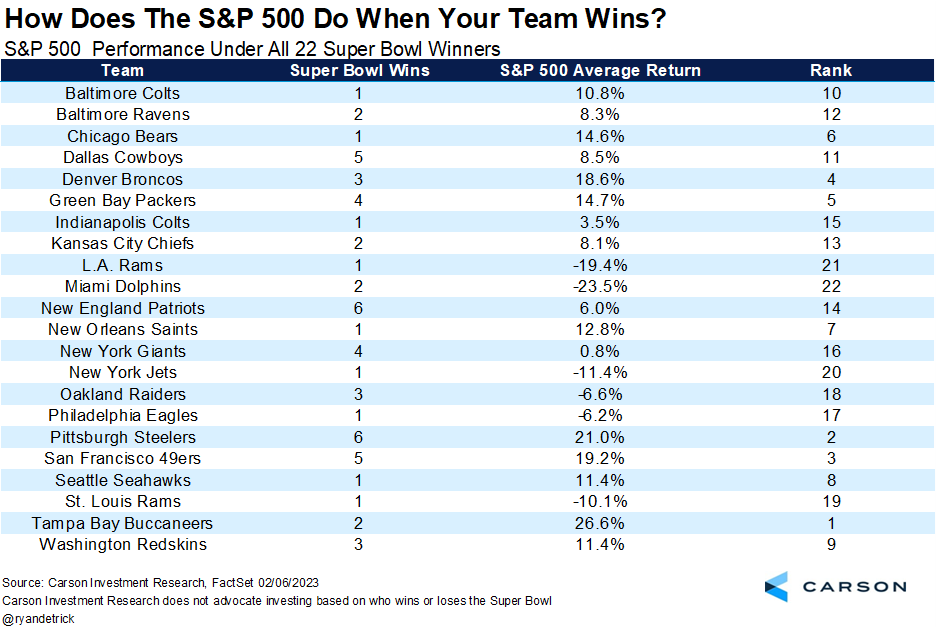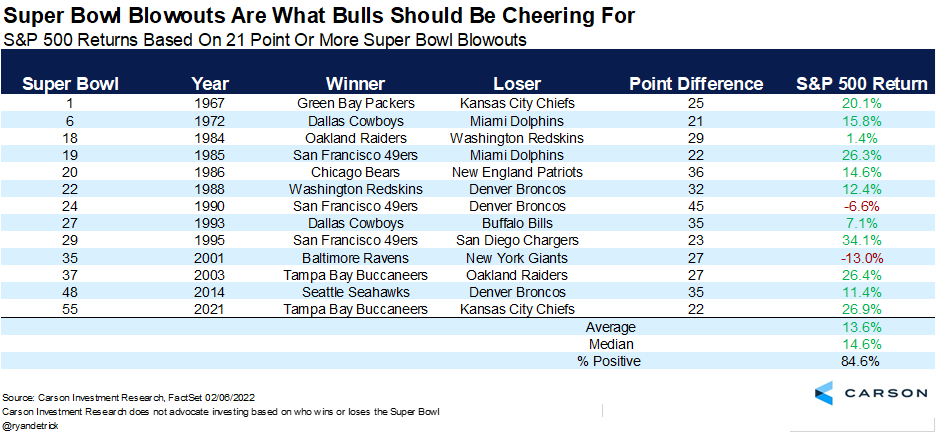“Baseball is 90% mental, the other half physical.” Yogi Berra
First things first, don’t ever invest based on who wins the Super Bowl. Or the coin toss, or how bad the refs will be, etc. With that out of the way, it is Super Bowl season and that means it is time to talk about the always-popular Super Bowl Indicator!
The Super Bowl Indicator suggests stocks rise for the full year when the Super Bowl winner has come from the original National Football League (now the NFC), but when an original American Football League (now the AFC) team has won, stocks fall. Of course, this is totally random, but it turns out that when looking at the previous 56 Super Bowls, stocks do better when an NFC team wins the big game. But as Yogi playfully told us in the quote above, sometimes things don’t always add up, and investing on this isn’t going to add up.
This fun indicator was originally discovered in 1978 by Leonard Kopett, a sportswriter for the New York Times. Up until that point, the indicator had never been wrong.
We like to make it a little simpler and break it down by how stocks do when the NFC wins versus the AFC, ignoring the history of the franchises. As our first table shows, the S&P 500 gained 10% on average during the full year when an NFC team won versus up less than 7% with an AFC team won. Now, this totally random indicator isn’t perfect, as the Rams won last year, and stocks had a horrible year. Yet another reason why the Gods should have let my Bengals win that game. I digress…
So, it is clear-cut that investors want the Eagles to fly high and win, right? Maybe not. As stocks have gained the full year 10 of the past 11 times when a team from the AFC won the championship. In fact, the only time stocks were lower was in 2015, when the full year ended down -0.7%, so virtually flat.
By my math, there have been 56 Super Bowls and 22 different winners. I broke things up by franchise and city. For instance, Baltimore has won three championships, with one from the Colts and two for the Ravens. So I differentiated the two. Then the Colts won one in Indy, so I broke that out as well. Either way, I still don’t see my Bengals on here, but I expect that the change next year in Vegas at the Super Bowl in February 2024.
Getting to the two teams in it this year, the Chiefs have won twice and stocks gained 8.5%, about average, while when the Eagles won in 2018, stocks finished lower for the year.
Speaking of Philly championships, here was a fun one we shared during the World Series. Turns out, very bad things happened when the City of Brotherly Love won the World Series. I’m talking panics, depressions, recessions, and financial crises. Maybe we shouldn’t be rooting for Philly now?
Perhaps investors have been looking at it all wrong though?
It might not matter who wins, but by how much they win. I was looking at the data and noted the Bengals lost by only three last year to the Rams, and stocks did poorly. Then I saw that some years with lopsided scores had some great market returns and vice versa. Well, wouldn’t you know it? The larger the size of the win, the better stocks do. (Let’s have another disclosure that nearly everything I’m saying here isn’t in any way, shape, or form related to what stocks actually do, and you shouldn’t use it as such)
That’s right, when it is a single-digit win in the Super Bowl, the S&P 500 is up less than 5% on average and higher less than 60% of the time. A double-digit win? Things jump to about 11% and 79%. And wouldn’t you know it, when the final score is three touchdowns or more, the S&P 500 gained 13.6% for the year and is higher about 85% of the time.
Here’s a list of all the big blowouts and what happened to stocks those years. Not too bad, huh?
Here are ten other takeaways I noticed while slicing and dicing the data:
- The NFC has won 29 Super Bowls and the AFC 27.
- The Steelers and Pats have won the most at six.
- As great as Peyton Manning was, he only won two Super Bowls. His brother also won two. Odds are their kids will win a few more. Omaha, Omaha!
- The NFC won two in a row and hasn’t won three in a row since the Saints, Packers, and Giants in 2010, 2011, and 2012.
- The NFC won 13 in a row from 1985 (Bears) until 1997 (Packers).
- The Bills made the Super Bowl four consecutive years, losing each time.
- The highest-scoring game was 75 total points in 1995 between the 49ers and Chargers.
- The lowest-scoring game was only 16 points in 2019 when the Pats beat the Rams.
- The closest ever was a one-point win for the Giants over the Bills in 1993 (the Scott Norwood game).
- In 1990 the 49ers beat the Broncos by 45 for the largest win ever.
So, there you have it, your complete breakdown for the big game. I’m saying the Eagles, as they have the best offensive and defensive lines. But Mahomes and Chiefs are awesome, and it’ll likely be a great game. In the end, I just hope the refs don’t ruin it with bad calls all against one team like they did in the AFC Championship. Make it an even game for both teams, Zebras!
Past performance is not an indication or guarantee of future results.








